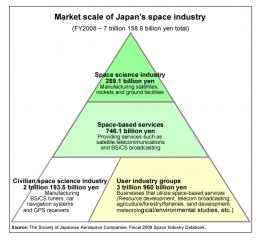PLANETARY EXPLORATION IN DEEP SPACE IS A FIELD IN WHICH JAPAN CAN MAKE AN INTERNATIONAL CONTRIBUTION.
Developing & producing national rockets becoming more difficult
Japan may have adopted science and technology as an area of national interest after WWII, but in the field of space development, its future hardly looks bright. In fact, unless we fundamentally revise our space strategy, Japan may eventually become a second-rate nation in this area. Employment in the national space science industry, which encompasses rockets and satellites, has consistently declined since peaking in 1995, and about fifty companies have withdrawn from the market in the last several years. This has made it more difficult to supply the parts necessary to develop and manufacture the H-IIA rocket. Japan is rapidly losing what we call “The ability to travel space on our own” or “The ability to operate in space”–meaning the national capacity to launch rockets and satellites with fully national parts and under national
development systems.
The market of space-based technology assumes a pyramidal structure, topped by the space science industry of advance technology, and fields such as space-based services, civilian space science, and user industry groups spread under it. (See figure) The total scale of the market in Japan is said to be around 7 trillion yen (FY2008, as surveyed by The Society of Japanese Aerospace Companies), a fairly decent scale. The space science industry accounts for 259.1 billion yen, of which over 90% consists of government demand.
The structure in which government demand supports the space science industry resembles that of the United States, China and Russia. But Japan’s budget is less than one-tenth that of the United States, with tough financial circumstances in recent years making it difficult for the nation to even sustain the current budget. In other words, it is clear that the national space science industry would contract sharply if it merely relied on government demand. In addition, a major problem particularly in Japan is that government demand does not necessarily fuel private demand. The primary objective of the space science industry in Japan was initially research and development, and it lacked the notion of transferring the results of its R&D to private business.
Yet science and technology must be linked closely with economic fields and benefit people, and I believe that space technology is no exception. Pure science, on the other hand, aims to contribute to understanding nature and is not necessarily linked to profits in the economic sense. Japan often confuses “science and technology” with “pure science,” but they are essentially two completely different concepts.
Is the manned space flight project really necessary?
If science and technology must principally benefit the people, we have every reason to run strict assessments on the cost effectiveness of space-based technological developments. For example, while China and India constantly attempt manned space flight for the purpose of arousing nationalism, Japan has very little need to pay huge costs to continue its manned flight projects. During a Space Development Committee meeting of the Ministry of Education, Culture, Sports, Science and Technology (MEXT) on August 2010, the country announced out of the blue its plan to develop a Japanese manned spacecraft, anticipating a cost of over one trillion yen. Considering that Japan’s annual space-related budget is about 339 billion yen (FY2010), this hardly seems a realistic idea.
Japan’s manned flight project comes merely from the idea of sending Japanese astronauts to stay at (the Japanese compound of) the International Space Station constructed under the leadership of the United States. Despite having spent about one trillion yen of national money over a period of more than twenty years, the project has few technological achievements, let alone any significant scientific discoveries. MEXT, possibly sensing all the criticism, explained that Japan’s manned flight project is for the sake of “space diplomacy,” which is effectively directed at the United States alone and can hardly be considered an international contribution.
In fact, I believe that we should quit the manned flight project once and for all. That would immediately free up its annual 40 billion yen budget, which could then be used wisely as a catalyst to stimulating private investments. The reason why satellite broadcasting companies in Japan do not use domestic rockets is simply because of cost. Launching an H-IIA rocket costs 9 billion yen, but if the European Space Agency (ESA) Ariane rocket were to fly at 7 billion yen, no one would logically think of using our national rocket. But the government could bridge that difference with a national subsidy. If the country could launch one rocket after another for commercial as well as government satellites, it could maintain the technological standing that it is struggling to hold.
Were that to happen, we should also consider launch pads. Tanegashima alone would not suffice. If we could think beyond the Japanese territory, we could choose to construct a launch pad on foreign territory, such as Christmas Island (Australian territory) near the equator. The construction cost should come from the budget for the suspended manned flight project. Our capacity to launch national rockets would improve drastically, and Japan Aerospace Exploration Agency (JAXA) and other companies associated with rocket production should welcome the effect with all honesty. Or, if we want to use our budget more efficiently, we could even rent a launch pad in India. One part of our “space diplomacy” should be, after all, to extend our friendship with India.
The responsibility of the inert DPJ government
If we were to focus our space-related budget radically in this way, Japan still has sufficient potential to regain its ability to explore space on its own and to operate in space. To achieve this, we first need to reform the current system under which every space-related ministry/agency submits their own individual requests and the government patchworks them together in executing its policies and budget. If I may describe this in more detail, our country’s space policy is effectively determined by the interests of MEXT, which is responsible for about 185.4 billion yen, or over half the approximately 339 billion yen space-related budget. The ministry’s annual budget request merely compiles “ideas” submitted from each JAXA department, making it a sort of vested interest. I personally do not see it reflecting any space strategy that Japan should ideally pursue.
Because science and technology works on the principle of providing a public benefit, as I mentioned earlier, the decision on which field should get budget priority must be top-down, with the Cabinet demonstrating strong leadership. This is clearly different from pure science, in which researchers wanting to undertake certain research request a budget–a bottom-up approach. When the Democratic Party of Japan, which advocates government leadership, took power in September 2009, I anticipated that fundamental reforms would be made to the space-related budget, which had always succumbed to MEXT interests.
At that point, Seiji Maehara, who had just become minister in charge of space development, appointed me chairman of the Experts’ Meeting on Future Space Policy. He called on me and said, “I’ll leave it up to you.” I offered specific suggestions on the approach to research and development in light of practical technology transfers, and on establishing a Space Agency (tentative title) that functions under the Cabinet Office and drafts a cross-ministerial national strategy to make the nation’s space policy more transparent and to bring decision-making and budget execution procedures under one line of command.
While this Experts’ Meeting disbanded in August 2010, some of its members continue their work at the Special Group to Research on Space Development Strategy, an advisory institution to the Space Development Strategy Department (which is headed by the prime minister). But when the minister in charge of space development subsequently changed from Maehara to Kaieda Banri to Genba Koichiro in short succession, government leadership in fact slowed. Worried that this situation would indeed leave Japan as a second-rate power in space development, I intend to summarize the nation’s ideal space strategy as an interim report by July and submit it to the government, considering it our last chance. Yet if we look at the current political scene, expecting government leadership to revise the nation’s space development is almost fantasy. I wonder how future generations will evaluate our country’s politicians today, who do nothing or who have done nothing at an important crossroads in Japan’s space strategy?
What is Japan’s strength?
This may be our current situation, but if we were to envision a space strategy built on Japan’s strengths, what would it look like? Let me offer an opinion.
Where does Japan’s space technology stand in the world? We need an objective assessment. According to Futron, a U.S. survey company, Japan ranked seventh in space development competitiveness for 2008, after the United States, the European Union, Russia, China, India, and Canada. Many Japanese may feel that this is lower than expected for a country that touts its science and technology. Japan enacted the Aerospace Basic Act in 2008 and drafted the Aerospace Basic Plan in 2009, which earned some praise and pushed Japan’s rank up to fourth overall that year. Yet Japan’s competitive position is almost level with China, India and Canada, with Korea following close behind. If Japan is to rank with the likes of the United States and Europe, it would need a budget at least several times greater than it allocates today. Considering the nation’s current financial circumstances, one wonders whether our attempt to make a international contribution or arouse nationalism in this field is realistic.
On the other hand though, when we look at space science, we see that only four countries (or regions)–the United States, the European Union, Russia and Japan–have actually achieved deep space exploration (which means going beyond the Earth’s gravitational pull). Since Russia today only launches satellites and does not conduct planetary explorations, only the United States, the European Union, and Japan conduct practical explorations that can deliver results. In other words, Japan is one of the global Big Three in space science. I believe that this is Japan’s strength. And taking advantage of it is an important strategy for us.
Talk about planetary exploration and we quickly recall the dramatic journey of Hayabusa, which brought home samples of the asteroid Itokawa. The drama in overcoming numerous mishaps and making a miraculous return to Earth, upon which it released a container with its samples before burning out in re-entry touched Japanese heartstrings. But Hayabusa involved a great deal of luck and several coincidences, and we could hardly call it a technological success. I am quite confident this is a legitimate evaluation. More critically, if Hayabusa had returned perfectly as planned without the accidents en route, I wonder if it would have made as many headlines.
The satellites that Japan launches are effectively considered to be equivalent to engineering experiment probes, so our planetary exploration projects lack a perspective on the original purpose of launching them or collecting samples. Japan also lacks researchers who are sufficiently trained for this work. In other words, we have acquired technological means and instruments capable of travelling into deep space and back, but we have yet to discuss how to link them to pure science. I still question the significance of having spent billions of yen on the Hayabusa project, when it was merely an engineering test.
The significance of discovering extraterrestrial life
So why should Japan explore deep space? We need to make this point clear once and for all.
In pure science, mankind has always opened new frontiers of knowledge. There are several phenomena that mankind has confirmed in its history up through the twentieth century. In academia, we confirmed that the laws of physics and chemistry hold true in space. In other words, mankind confirmed that physics and chemistry maintain a cosmic universality. Earth science is also close to achieving universality, though at present only to the galactic level.
What about biology then? To date, we have only confirmed life on Earth, and the study has yet to achieve a universal standard at cosmic scale. Biology remains “Earth biology,” and is a late developer compared to physics and chemistry.
Theoretically, I personally believe that life must surely exist in many forms even beyond Earth. From around the end of the twentieth century, many celestial bodies within our galaxy have been found to be similar to Earth. This is what has led us to study and debate the distribution and origins of life on a cosmic scale, and my team’s launch of the Planetary Exploration Research Center at Chiba Institute of Technology in April 2010 was one action that arose from this.
Celestial bodies within the solar system that are currently subjects of debate on the existence of life forms are Mars (the fourth planet in the solar system), Europa (one of the Galileo moons of Jupiter), and Titan (the largest moon of Saturn). My current subject of interest is Mars. There have been recent reports of methane findings on Mars. Here on Earth, we have methane-producing bacteria. These reports have thus heightened the possibility that life forms exist on Mars. But is there really methane on Mars? And if there is, how is it produced? These questions remain unanswered.
My idea on this is that we develop miniature, methane-analyzing devices equipped with transmitters and scatter them over Mars, and then analyze data from these devices to learn more about methane on the Red Planet. If Japan could develop these devices, I am sure that planetary exploration probes not only from our country but also from the U.S. National Aeronautics and Space Administration (NASA) and ESA would happily bring them aboard. We are also planning to use a chamber (testing equipment) that simulates the environment on Mars to experiment with the types of life forms that could survive in the Mars environment.
I believe that Venus also has life forms and I hope that it can be explored at some point. My ultimate target is Titan, which has an atmosphere similar to that on Earth. If studies on extraterrestrial life forms develop in this way, biology should gradually achieve a cosmic universality.
When that happens, we will be better placed to answer questions such as “What is life?” “What are humans?” and “What is civilization?” These are questions that were conventionally within the realm of the humanities. In my words, we live in a “homosphere or humansphere” that we have created on the “Earth system” and call it “civilization.” But we currently face serious issues with the environment, population, and food, which are shaking the very foundations of what makes a civilization. That is why the challenge of rediscovering the meaning of civilization is of universal importance, relevant not only to a nation but to all mankind. Japan, with its ability to explore deep space, should take the initiative and rise to meet that challenge. These feelings are what lie at the heart of a Japanese space strategy that I believe is ideal.
In Japan today, when people talk about launching a planetary exploration probe they only consider using an enormous rocket like the H-IIA and sending into space a huge probe weighing close to a ton. And that only happens at infrequent intervals of once every few years, involving immense cost. I hope to change this very notion of planetary exploration. It is better for the sake of “pure space science” discovery to develop smaller and less expensive rockets and to undertake planetary exploration with greater frequency. Skill at downsizing equipment has been and remains a Japanese strength. There is so much that our country can yet do to make a true international contribution in space development.
Translated from the Special Report 2 ‘Japan’s pride! National space technology’: Shin-uchuu deno wakusei-tansa koso nihon no koken da,” Voice, May 2011, pp. 170-176. (Courtesy of PHP Kenkyusho)




